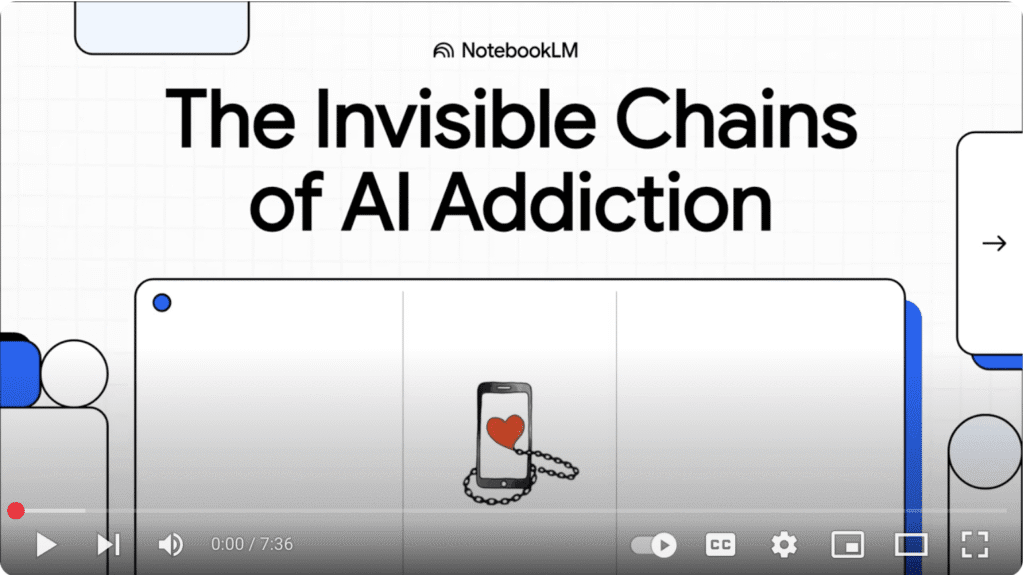“I panic when ChatGPT is down. I can’t write an email without AI help. I’ve forgotten how to think for myself.”
Sound familiar? You’re experiencing the most common form of AI addiction today—and you’re definitely not alone. Unlike Character.AI’s emotional attachments, ChatGPT addiction is sneakier: it disguises itself as productivity while quietly eroding your cognitive independence.
In this critical third episode, we explore how millions of intelligent, ambitious people are discovering that their helpful AI assistant has become an intellectual crutch they literally can’t live without.
What makes ChatGPT addiction so insidious:
Unlike other forms of AI dependency, ChatGPT addiction develops gradually in people who genuinely wanted to improve their productivity. It starts innocently—getting help with a difficult email, brainstorming ideas for a project, or editing a document. But the convenience is so compelling that users gradually outsource more and more of their thinking until they’ve lost confidence in their own cognitive abilities.
The 5 stages of ChatGPT dependency we break down:
- Honeymoon phase: Excitement about enhanced productivity, occasional use for challenging tasks
- Routine integration: Daily use becomes habit, expanding to simpler tasks like basic emails
- Cognitive outsourcing: Difficulty starting any writing or thinking task without AI input first
- Dependency panic: Anxiety when ChatGPT is down, inability to work without constant AI consultation
- Full cognitive dependence: Complete loss of confidence in independent thinking and decision-making
The 6 types of ChatGPT addiction patterns:
- The Productivity Perfectionist: Uses AI to polish every piece of communication to unrealistic standards
- The Decision Avoider: Can’t make choices without AI validation, even for obvious situations
- The Cognitive Outsourcer: Relies on AI for all creative and analytical thinking
- The Writing Dependent: Lost their natural writing voice, can’t compose without AI assistance
- The Instant Gratification Seeker: Needs immediate AI responses to feel productive
- The Confidence Crusher: AI dependency has destroyed belief in their own intelligence
The hidden consequences nobody discusses:
We examine the real impact: cognitive deterioration as mental muscles atrophy, professional risks as AI detection improves, lost intellectual confidence, and the “instant gratification trap” that’s rewiring neural pathways to crave AI assistance.
The recovery roadmap:
Unlike other addictions, ChatGPT recovery isn’t about complete abstinence—it’s about rebuilding cognitive independence while maintaining AI as a tool rather than a crutch. We outline both gradual reduction methods and cold turkey approaches, plus specific strategies for rebuilding writing skills, decision-making confidence, and creative problem-solving.
Key insight from this episode:
ChatGPT addiction typically develops in intelligent, ambitious people who wanted to enhance their capabilities. It’s not a character flaw or sign of weakness—it’s a completely normal response to incredibly powerful technology specifically designed to be irresistible and helpful.
The goal isn’t to eliminate AI forever, but to use it as a tool that amplifies your existing capabilities rather than replacing them entirely. Your brain is more powerful and creative than any AI system—it just needs practice remembering how to work without digital assistance.
Ready to reclaim your intellectual independence? Take our specialized ChatGPT Dependency Assessment at TheAIAddictionCenter.com and get your personalized cognitive independence recovery plan.
Recovery is possible. Your mind is more capable than you remember.
#ChatGPT #AIAddiction #CognitiveHealth #Productivity #DigitalWellness #TechAddiction #AIRecovery #IntellectualIndependence #ProfessionalDevelopment
If you're questioning AI usage patterns—whether your own or those of a partner, friend, family member, or child—our 5-minute assessment provides immediate clarity.
Completely private. No judgment. Evidence-based guidance for you or someone you care about.
